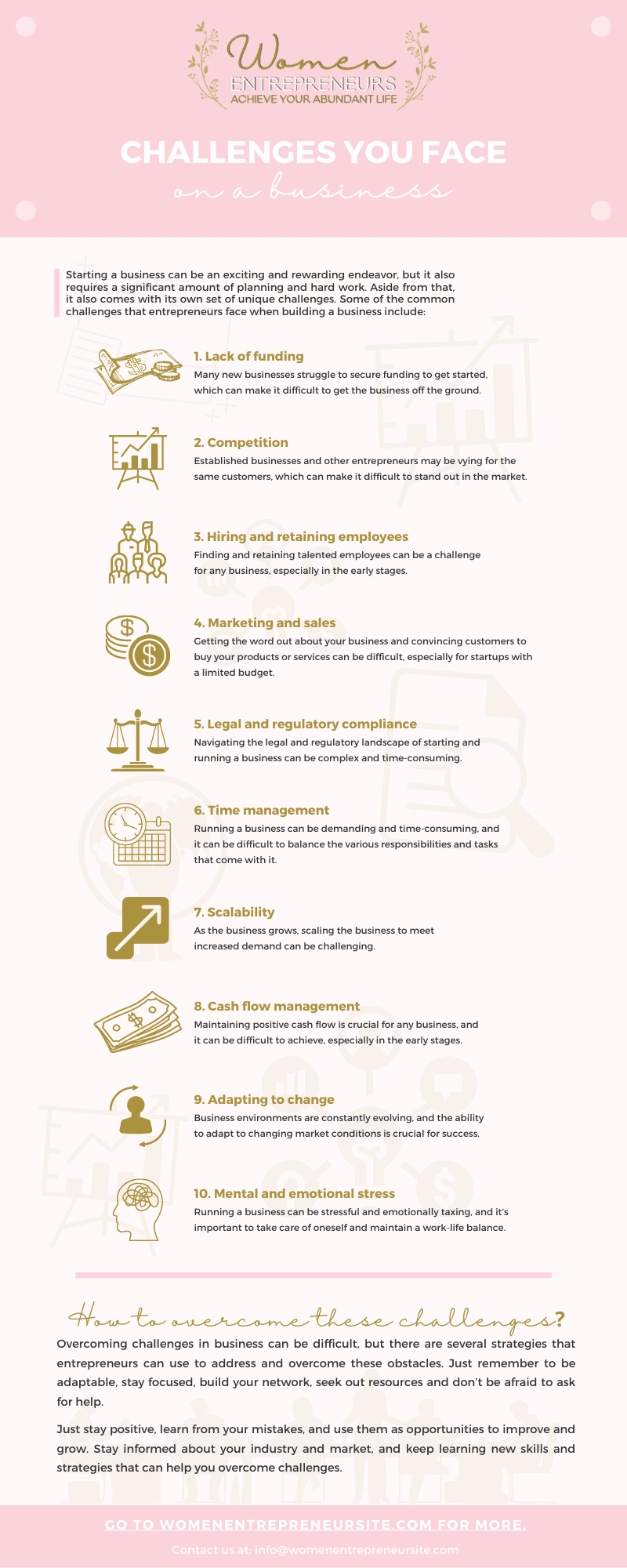In the realm of professional growth, there comes a pivotal moment for many individuals when the…
Challenges You Face on a Business

Embarking on a business venture can present obstacles, but it can also be a fulfilling and satisfying pursuit. The first step is to conduct market research and validate the feasibility of your business idea. Once you have a clear understanding of the market and competition, you can develop a business plan outlining your goals, target market, marketing and sales strategies, financial projections, and management structure.
Securing funding is also a crucial step, as you will need to determine how to finance your business, whether it be through personal savings, investors, or a loan. Registering your business and obtaining the necessary licenses and permits is also important. After that, you can focus on building your team and creating a solid strategy for acquiring customers.
As your business grows, it’s important to stay adaptable and always be open to change. Remember that starting a business takes time, effort, and patience, but with hard work and dedication, you can achieve success.
The 1-Page Marketing Plan:
You need to stop randomly marketing your business and start following a reliable plan for rapid business growth if you want to be successful. A marketing plan has traditionally been a difficult and time-consuming process, which is why many companies don’t create them.
Business Building Challenges
Starting a business can be an exciting and rewarding endeavor, but it also requires a significant amount of planning and hard work. Aside from that, it also comes with its own set of unique challenges. Some of the common challenges that entrepreneurs face when building a business include:
1. Lack of funding
Many new businesses struggle to secure funding to get started, which can make it difficult to get the business off the ground.
2. Competition
Established businesses and other entrepreneurs may be vying for the same customers, which can make it difficult to stand out in the market.
3. Hiring and retaining employees
Finding and retaining talented employees can be a challenge for any business, especially in the early stages.
4. Marketing and sales
Getting the word out about your business and convincing customers to buy your products or services can be difficult, especially for startups with a limited budget.
She Means Business:
- Is your business idea ready to take off?
- With a computer and an Internet connection, you can share and promote your ideas, messages, and business like never before.
5. Legal and regulatory compliance
Navigating the legal and regulatory landscape of starting and running a business can be complex and time-consuming.
6. Time management
Running a business can be demanding and time-consuming, and it can be difficult to balance the various responsibilities and tasks that come with it.
7. Scalability
As the business grows, scaling the business to meet increased demand can be challenging.
8. Cash flow management
Maintaining positive cash flow is crucial for any business, and it can be difficult to achieve, especially in the early stages.
9. Adapting to change
Business environments are constantly evolving, and the ability to adapt to changing market conditions is crucial for success.
10. Mental and emotional stress
Running a business can be stressful and emotionally taxing, and it’s important to take care of oneself and maintain a work-life balance.
In the Company of Women:
“I want to rip out every page of this glorious book and hang them on my wall so that I can be surrounded by these incredible women all day long.”
— Emma Straub, New York Times bestselling author of The Vacationers and Modern Lovers
How to overcome these challenges?
Overcoming challenges in business can be difficult, but there are several strategies that entrepreneurs can use to address and overcome these obstacles. Just remember to be adaptable, stay focused, build your network, seek out resources and don’t be afraid to ask for help.
Just stay positive, learn from your mistakes, and use them as opportunities to improve and grow. Stay informed about your industry and market, and keep learning new skills and strategies that can help you overcome challenges.
Remember to prioritize self-care, which includes attending to both your physical and mental well-being. It’s important to maintain a healthy work-life balance and manage stress in order to perform at your best.







